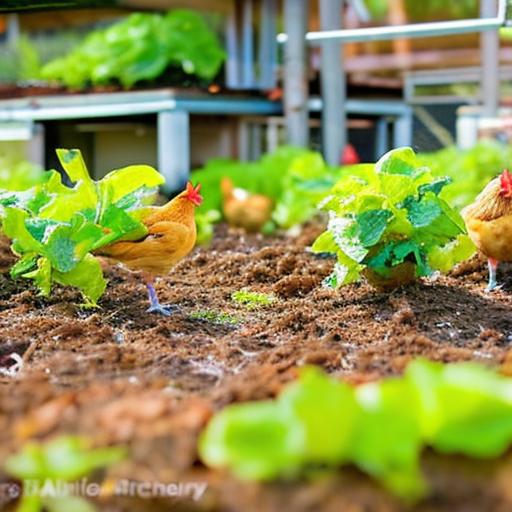Raising chickens in the city may seem like an unconventional idea, but it is becoming increasingly popular among urban dwellers. There are numerous benefits to keeping chickens in an urban environment, including access to fresh eggs and meat, the ability to create fertilizer for your garden, and the educational experience it provides for children. Additionally, raising chickens in the city promotes sustainable living practices and allows individuals to connect with nature in a unique way.
One of the most obvious benefits of raising chickens in the city is the access to fresh eggs and meat. By keeping a small flock of chickens, urban dwellers can have a constant supply of nutritious eggs right in their own backyard. Not only are these eggs fresher and tastier than store-bought ones, but they also have a higher nutritional value. In addition to eggs, some urban chicken keepers choose to raise chickens for meat as well. This allows them to have a source of organic, free-range meat that they can trust.
Another benefit of raising chickens in the city is the ability to create fertilizer for your garden. Chicken manure is rich in nutrients and can be used as a natural fertilizer for plants. By composting chicken manure and using it in your garden, you can improve soil quality and promote healthy plant growth. This not only reduces the need for chemical fertilizers but also helps to reduce waste by recycling chicken manure.
Raising chickens in the city also provides an educational experience for children. Children can learn about where their food comes from and gain a sense of responsibility by caring for the chickens. They can also learn about the life cycle of chickens and witness firsthand the process of hatching eggs and raising chicks. This hands-on experience can be both educational and rewarding for children, teaching them important life skills and fostering a connection with nature.
Furthermore, raising chickens in the city promotes sustainable living practices. By keeping chickens, urban dwellers can reduce their carbon footprint by producing their own food and reducing food waste. Chickens also help to control pests in the garden, reducing the need for chemical pesticides. Additionally, raising chickens encourages individuals to live more self-sufficiently and connect with nature in an urban environment.
Key Takeaways
- Raising chickens in the city can provide numerous benefits, including fresh eggs, natural pest control, and a deeper connection to food production.
- Before starting an urban chicken farm, it’s important to research and understand local zoning laws and regulations.
- Choosing the right breed of chicken is crucial for success in urban chicken keeping, as some breeds are better suited for small spaces and colder climates.
- Coop design and maintenance are important factors to consider, as a well-designed coop can keep chickens safe and healthy.
- Proper feeding and watering are essential for the health and productivity of urban chickens, and composting can help manage waste in a small-space environment.
Understanding Local Zoning Laws for Urban Chicken Keeping
Before embarking on the journey of raising chickens in the city, it is important to understand and comply with local zoning laws and regulations. Each city or municipality may have different rules regarding the keeping of chickens, so it is essential to do thorough research before starting your urban chicken farm.
The first step is to research local laws and regulations regarding urban chicken keeping. This can usually be done by visiting your city or municipality’s website or contacting the local government office. Look for information on the number of chickens allowed, coop placement requirements, and any other restrictions or permits that may be required.
Once you have a clear understanding of the local laws, you may need to obtain necessary permits or licenses to keep chickens in your backyard. This may involve filling out an application, paying a fee, and meeting certain requirements such as coop size and placement. It is important to follow these procedures to ensure that you are in compliance with local regulations.
In addition to permits, it is important to understand any restrictions on the number of chickens allowed and coop placement. Some cities may have limits on the number of chickens you can keep, while others may have specific requirements for coop placement such as setbacks from property lines or neighboring houses. Understanding these restrictions will help you plan your urban chicken farm accordingly.
Choosing the Right Breed of Chicken for Your Urban Farm
When it comes to choosing the right breed of chicken for your urban farm, there are several factors to consider. These include temperament, egg-laying ability, and noise level. By carefully selecting the right breed, you can ensure a successful and enjoyable experience raising chickens in the city.
Temperament is an important consideration when choosing a breed of chicken for your urban farm. Some breeds are known to be more docile and friendly, while others may be more skittish or aggressive. It is important to choose a breed that is well-suited to your family and living situation. If you have children or plan to interact with your chickens frequently, a friendly and docile breed may be the best choice.
Egg-laying ability is another important factor to consider when choosing a breed of chicken. Some breeds are known for their high egg production, while others may lay fewer eggs. If you are primarily interested in raising chickens for eggs, it is important to choose a breed that is known for its egg-laying ability. This will ensure that you have a constant supply of fresh eggs for your family.
Noise level is also an important consideration when choosing a breed of chicken for your urban farm. Some breeds are known to be more vocal than others, and this can be a concern if you have close neighbors or live in a densely populated area. It is important to choose a breed that is known for being relatively quiet to avoid any potential noise complaints.
When it comes to purchasing chickens, there are several options available. You can purchase chicks from a hatchery or local breeder, or you can adopt adult chickens from a rescue organization. It is important to choose reputable sources and ensure that the chickens you purchase are healthy and well-cared for.
Coop Design and Maintenance for Small-Scale Chicken Keeping
Building or purchasing a coop that fits your space and needs is an essential part of urban chicken keeping. The coop provides shelter and protection for your chickens, so it is important to design or choose one that meets their needs.
When designing or choosing a coop, it is important to consider the size of your flock and the available space in your backyard. The coop should provide enough space for each chicken to move around comfortably and have access to nesting boxes and perches. It should also be secure and predator-proof to protect your chickens from harm.
Proper ventilation and insulation are also important considerations when it comes to coop design. Chickens produce a lot of moisture and ammonia, so it is important to have adequate ventilation to prevent the buildup of harmful gases. Insulation is also important to keep the coop warm in the winter and cool in the summer.
Cleaning and maintenance are essential for keeping your coop in good condition and ensuring the health and well-being of your chickens. Regularly cleaning out the coop and replacing bedding will help to prevent the buildup of waste and reduce the risk of disease. It is also important to regularly check for signs of pests or predators and make any necessary repairs or improvements to the coop.
Feeding and Watering Your Urban Chickens
Feeding and watering your urban chickens is an important part of their care and well-being. Providing a balanced diet and fresh water will help to ensure that your chickens are healthy and productive.
When it comes to feeding your chickens, it is important to choose the right feed for their age and stage of life. There are different types of chicken feed available, including starter feed for chicks, grower feed for young chickens, and layer feed for adult hens. It is important to provide a balanced diet that includes a mix of grains, protein, vitamins, and minerals.
In addition to commercial feed, it is also important to provide fresh water for your chickens at all times. Chickens need access to clean water to stay hydrated and maintain their health. It is important to regularly check and clean their water containers to ensure that they are free from dirt, debris, or algae.
Supplements can also be beneficial for your urban chickens. Calcium supplements, such as crushed oyster shells or eggshells, can help to ensure strong eggshells. Grit, which is small stones or pebbles, can help chickens digest their food properly. It is important to provide these supplements in separate containers so that chickens can access them as needed.
Feeding and watering in a small space can be a challenge, but there are several tips and tricks that can help. Using hanging feeders and waterers can help to save space and prevent contamination. It is also important to regularly clean and refill feeders and waterers to ensure that they are fresh and free from mold or bacteria.
Managing Waste and Composting in a Small-Space Environment

Managing waste and composting in a small-space environment is an important consideration when raising chickens in the city. Proper waste management not only helps to keep your coop clean and odor-free but also allows you to create valuable compost for your garden.
Composting chicken manure is an excellent way to recycle waste and create nutrient-rich fertilizer for your garden. Chicken manure is high in nitrogen, phosphorus, and potassium, making it an excellent source of nutrients for plants. By composting chicken manure, you can reduce waste and create a valuable resource for your garden.
Proper disposal of waste is also important when raising chickens in the city. Chicken manure should never be dumped or washed into storm drains or waterways, as it can contribute to water pollution. Instead, it should be composted or disposed of properly according to local regulations.
Managing waste in a small space can be challenging, but there are several tips that can help. Using deep litter bedding in the coop can help to absorb moisture and control odor. Regularly cleaning out the coop and replacing bedding will help to prevent the buildup of waste and reduce the risk of disease.
Health and Safety Considerations for Urban Chicken Keeping
Keeping your chickens healthy and safe is essential when raising chickens in the city. There are several common health issues to be aware of and steps you can take to prevent them. Additionally, it is important to protect your chickens from predators and take steps to maintain a healthy flock.
Common health issues in chickens include parasites, respiratory infections, and nutritional deficiencies. Regularly checking your chickens for signs of illness, such as lethargy, loss of appetite, or abnormal behavior, can help to catch any health issues early. It is also important to provide a balanced diet and access to fresh water to prevent nutritional deficiencies.
Protecting your chickens from predators is also important when raising chickens in the city. Common predators include raccoons, foxes, and neighborhood dogs. It is important to secure your coop and run with sturdy fencing and locks to prevent predators from gaining access. Regularly checking for signs of predators and making any necessary repairs or improvements to the coop can help to keep your chickens safe.
Maintaining a healthy flock is essential for successful urban chicken keeping. This includes regular health checks, vaccinations if necessary, and proper hygiene practices. It is important to quarantine new chickens before introducing them to the flock to prevent the spread of disease. Regularly cleaning and disinfecting the coop and providing a clean and dry environment will also help to maintain a healthy flock.
Integrating Chickens into Your Urban Garden or Homestead
Integrating chickens into your urban garden or homestead can provide numerous benefits for both your chickens and your garden. Chickens can help to control pests, provide natural fertilizer, and contribute to a more sustainable and self-sufficient lifestyle.
Using chicken manure as fertilizer is one of the main benefits of integrating chickens into your garden. Chicken manure is rich in nutrients and can be used as a natural fertilizer for plants. By composting chicken manure and using it in your garden, you can improve soil quality and promote healthy plant growth.
Allowing chickens to forage in your garden can also be beneficial. Chickens love to eat insects, slugs, and other pests that can damage your plants. By allowing them to forage in your garden, you can reduce the need for chemical pesticides and promote a more natural and sustainable approach to pest control.
Integrating chickens into your urban homestead can also provide a sense of self-sufficiency and connection with nature. By raising your own food and reducing your reliance on store-bought products, you can take a step towards a more sustainable lifestyle. Chickens also provide a source of entertainment and companionship, adding to the overall enjoyment of your urban homestead.
Building Community through Urban Chicken Keeping
Urban chicken keeping can also be a way to build community and connect with your neighbors. Sharing eggs and knowledge with neighbors can help to foster relationships and create a sense of community. Additionally, joining local chicken keeping groups or organizations can provide opportunities for learning, sharing experiences, and building connections with like-minded individuals.
Sharing eggs with neighbors is a great way to build community and promote sustainable living practices. By sharing the abundance of fresh eggs that your chickens produce, you can foster relationships and create a sense of community in your neighborhood. This can also be an opportunity to educate others about the benefits of urban chicken keeping and encourage them to start their own backyard flocks.
Joining local chicken keeping groups or organizations is another way to build community and connect with others who share your interest in urban chicken keeping. These groups often organize events, workshops, and educational programs that provide opportunities for learning, sharing experiences, and building connections. They can also be a valuable source of information and support for new or experienced chicken keepers.
Building community through sustainable living practices is another benefit of urban chicken keeping. By raising chickens in the city, you are promoting sustainable living practices such as producing your own food, reducing waste, and connecting with nature. This can inspire others in your community to adopt similar practices and contribute to a more sustainable and resilient city.
The Rewards of Sustainable Living in the City
In conclusion, raising chickens in the city offers numerous benefits for urban dwellers. From access to fresh eggs and meat to the ability to create fertilizer for your garden, there are many practical advantages to urban chicken keeping. Additionally, raising chickens in the city provides an educational experience for children and promotes sustainable living practices.
Understanding local zoning laws and regulations is essential when it comes to urban chicken keeping. By researching and complying with local laws, obtaining necessary permits, and understanding restrictions on number of chickens and coop placement, you can ensure a successful and legal urban chicken farm.
Choosing the right breed of chicken is also important when raising chickens in the city. Considering temperament, egg-laying ability, and noise level will help you select a breed that is well-suited to your family and living situation. It is also important to choose reputable sources when purchasing chickens to ensure their health and well-being.
Coop design and maintenance are essential for small-scale chicken keeping. Building or purchasing a coop that fits your space and needs, ensuring proper ventilation and insulation, and regularly cleaning and maintaining the coop will help to keep your chickens safe and healthy.
Feeding and watering your urban chickens is another important aspect of their care. Choosing the right feed for their age and stage of life, providing fresh water and supplements, and implementing feeding and watering strategies for small spaces will help to ensure that your chickens are healthy and productive.
Managing waste and implementing proper waste disposal methods are crucial for maintaining a clean and sustainable environment. Waste management involves the collection, transportation, and disposal of waste materials in a way that minimizes their impact on human health and the environment. It includes practices such as recycling, composting, and incineration. By effectively managing waste, we can reduce pollution, conserve resources, and prevent the spread of diseases. Additionally, proper waste disposal helps to protect wildlife and ecosystems by preventing the contamination of soil, water, and air. Overall, managing waste is essential for creating a healthier and more sustainable future for generations to come.
If you’re wondering whether you can keep chickens on just 1 acre in the city, you’ll definitely want to check out this informative article from Poultry Wizard. They provide valuable insights and tips on how to make the most of limited space while keeping chickens happy and healthy. For those who are concerned about the logistics of housing chickens, Poultry Wizard also offers a unique solution with their “Rent-a-Chicken Coop” service, which you can learn more about in this link. Additionally, if you’re interested in expanding your poultry endeavors beyond chickens, Poultry Wizard has another interesting article on whether quails sit on their eggs, which you can read here.
FAQs
What is the minimum space required to keep chickens in the city?
The minimum space required to keep chickens in the city is 2-3 square feet per chicken in the coop and 8-10 square feet per chicken in the run.
Can you keep chickens on 1 acre in the city?
Yes, you can keep chickens on 1 acre in the city. However, it is important to ensure that the chickens have enough space to move around and access to fresh food and water.
What are the benefits of keeping chickens in the city?
Keeping chickens in the city can provide a source of fresh eggs, reduce food waste by composting kitchen scraps, and provide natural pest control for gardens.
What are the challenges of keeping chickens in the city?
The challenges of keeping chickens in the city include noise complaints from neighbors, zoning regulations, and predators such as raccoons and foxes.
What are the basic requirements for keeping chickens in the city?
The basic requirements for keeping chickens in the city include a secure coop and run, access to fresh food and water, and regular cleaning and maintenance of the coop and run.
What breeds of chickens are best for city living?
Breeds of chickens that are best for city living include those that are quiet, docile, and adaptable to small spaces, such as the Rhode Island Red, Plymouth Rock, and Sussex.
Meet Walter, the feathered-friend fanatic of Florida! Nestled in the sunshine state, Walter struts through life with his feathered companions, clucking his way to happiness. With a coop that’s fancier than a five-star hotel, he’s the Don Juan of the chicken world. When he’s not teaching his hens to do the cha-cha, you’ll find him in a heated debate with his prized rooster, Sir Clucks-a-Lot. Walter’s poultry passion is no yolk; he’s the sunny-side-up guy you never knew you needed in your flock of friends!







